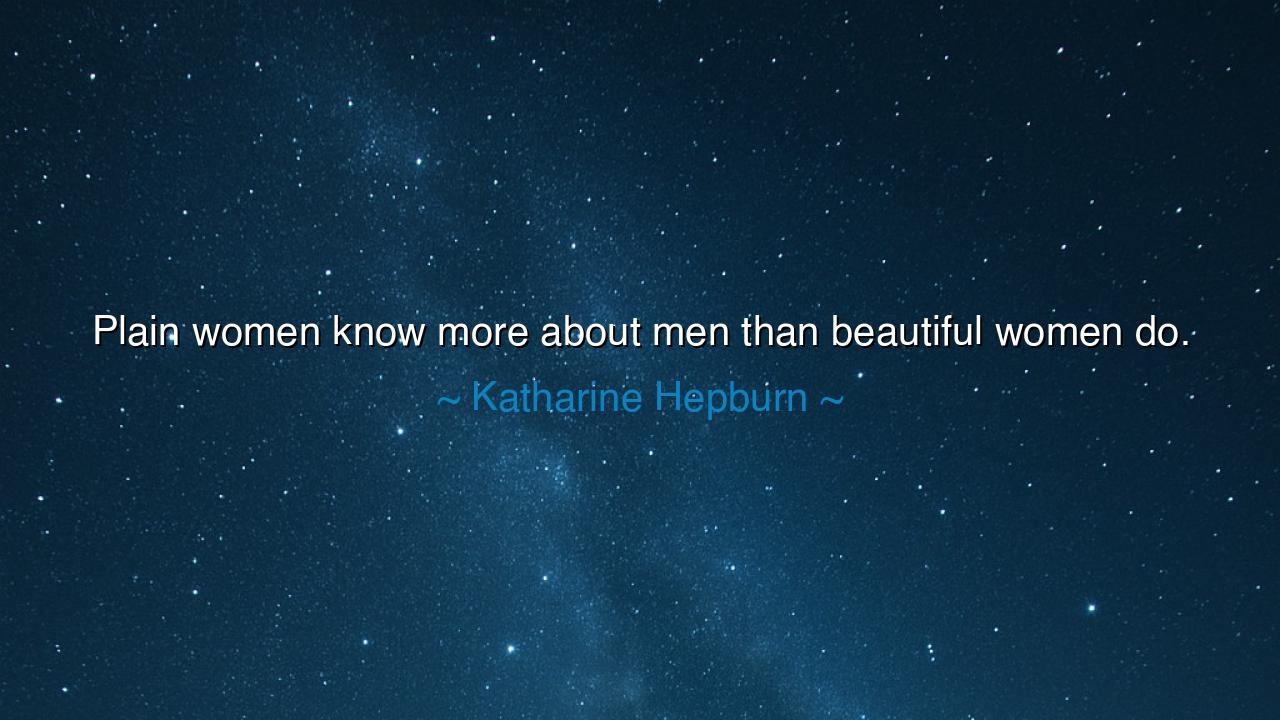
Plain women know more about men than beautiful women do.






The words of Katharine Hepburn—“Plain women know more about men than beautiful women do”—strike with the sharpness of a truth forged in fire. They reveal that wisdom is not always born of privilege, and that insight often comes to those who walk the harder road. The plain woman, unshielded by the easy favor that beauty commands, must learn to discern character, to read intention, to navigate the currents of desire and deception. The beautiful woman, though adored, is often veiled from such lessons, for doors are opened for her by appearance alone, and thus the subtler truths of human nature may pass unseen.
The origin of this wisdom rests in the nature of human interactions. Since the dawn of time, societies have placed crowns upon beauty. Songs are sung of fair faces, kingdoms have been won or lost for radiant forms. Yet such admiration blinds both giver and receiver. The beautiful woman often encounters men who project their desires onto her, who compete for her presence, but who rarely reveal their deeper selves. The plain woman, however, must meet men not as symbols of desire but as equals in dialogue. She becomes a student of character, an observer of weakness and strength, and thus her knowledge grows sharper than the edge of flattery.
Consider the tale of Socrates, who was not fair of face. Yet his wife, Xanthippe—often remembered for her sharpness—was said to know his soul better than any disciple. She was not blinded by the glamour that followers bestowed upon him; she saw his temper, his stubbornness, his humanity. Through her eyes we glimpse this truth: it is not beauty that grants the clearest vision of others, but the absence of illusions. The plain woman, denied illusions, becomes a master of discernment.
History offers also the example of Abigail Adams, wife of John Adams, the second president of the United States. She was not famed for dazzling beauty, yet her letters reveal a mind that understood men deeply—their ambitions, their flaws, their pride, and their fragility. While the statesmen of her day debated and postured, she counseled her husband with wisdom that shaped policy and vision. She saw through the facades of men because she was never distracted by the masks that beauty often attracts.
The lesson in Hepburn’s words is not to exalt the plain above the beautiful, but to remind us that hardship is a sharper teacher than ease. The woman who is not granted immediate favor must learn patience, strategy, wit, and perception. She becomes skilled in discerning sincerity from pretense, devotion from manipulation. And this knowledge, though born of struggle, becomes a power more enduring than beauty itself, which fades with time.
Practical wisdom follows: whether plain or fair, cultivate the art of seeing beneath appearances. Do not be content with admiration or flattery; instead, study the soul that speaks behind the eyes. Ask not only how a man treats you when he desires your favor, but how he treats those from whom he has nothing to gain. Seek not only the sweetness of words, but the weight of actions. In this way, you may know the truth of character, and wisdom will be your companion.
For in the end, Hepburn’s saying is not a wound to beauty but a tribute to resilience. Plain women, denied the world’s easy gifts, earn the deeper treasure of understanding. And beautiful women, if they would not be blinded by admiration, must strive to claim this treasure too. Thus, let all learn the higher lesson: to know others not by surface but by soul, not by allure but by truth.






HLHong Le
I think this quote brings up an important issue about how society views women and relationships. Is there truth to the idea that plain women are less objectified and therefore, might gain more of a genuine understanding of men? But then again, can beauty really block someone's emotional understanding, or is it all about the individual’s capacity to connect?
BLBest Liliana
Katharine Hepburn’s quote feels like it’s playing into stereotypes about both beauty and intelligence. While it’s true that beauty may lead to different social experiences, I don’t think this necessarily means that women who don’t meet traditional beauty standards automatically have more insight into men. Isn’t understanding someone more about emotional intelligence and shared experiences than appearance?
NQPham Ngoc Quang
This quote gives an interesting perspective on relationships. It’s almost as if it’s saying that beautiful women might rely more on their appearance to connect, while plain women are more likely to focus on deeper connections. But could this also apply to men? Do we place too much emphasis on looks rather than personality when it comes to understanding each other?
BNTran Bao Ngoc
I’ve heard variations of this quote before, and I think it speaks to the idea that beauty might sometimes limit how people are perceived or understood. But is it fair to assume that plain women have an advantage in understanding men? Couldn’t it just be a matter of experience and personality rather than looks?
BPBg Pu
This quote definitely makes me think about how society values looks. It almost seems to imply that attractive women might be seen more for their beauty than for their intelligence or emotional depth. Does this mean that plain women might have more opportunities to really connect with men? What about the complexities of personal connection beyond appearances?